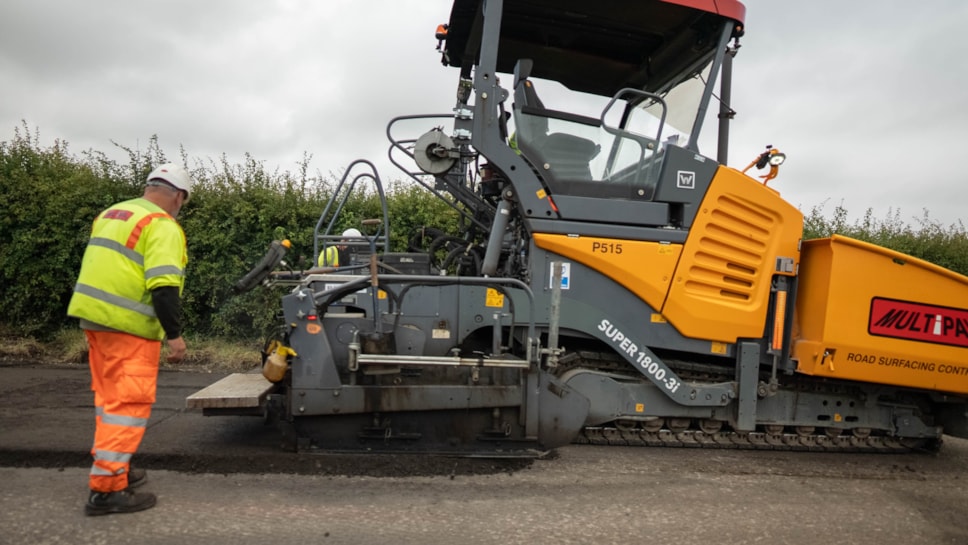
Repairs to roads are back on track
New figures show potholes are being fixed within strict time limits by Lancashire County Council.
The county council is responsible for around 4,600 miles of roads and keeping them in good condition is a challenge.
Wear and tear from heavy vehicles, around 38,000 sets of work by utility companies every year, and an increasingly wet climate all have a major impact. Last year saw record rainfall levels across the UK, which resulted in all councils, including Lancashire, having far more potholes to deal with than normal.
However, following a very busy summer of repairs and preventative maintenance, the council is back on track, with the vast majority of potholes and other defects being repaired within strict time limits.
The figures for June show that 94% of highway defects which meet the threshold for repair within 5, 10 and 20 days targets were repaired on time. That equates to 9,526 repairs in June alone.
The latest figures for July indicate that almost all repairs are now being made within target times. Over 93% of the most urgent issues, which have a threshold for repair within 4 hours or 2 days, are being repaired on time, with 96% of all other defects being repaired on time.
In 2024/25 the county council expects to spend around £29m on improving road surfaces, and around £25m on streetlights, bridges and other highways-related maintenance.
A key focus of this maintenance work has been to make the county’s roads more resilient, ready for the wet and cold weather we can expect again this coming winter.
The council carefully invests every penny we receive from the Government to maintain Lancashire's roads and transport infrastructure. Since 2020 an extra £20m has been spent on improving our highways on top of our allocations from Government – demonstrating that investing in our roads is a top priority for the county council.
County Councillor Rupert Swarbrick, cabinet member for highways and transport said:
"Our vast road network is vital to the daily life of every resident, worker and business in the county and that's why keeping your roads safe is our top priority.
"We have invested above and beyond normal levels this year and brought in contractors to help our highways teams work at pace to keep up with the repairs caused by record rainfall levels.
"Despite this, we did struggle earlier this year to meet the very strict targets we set ourselves to repair potholes on time. The good news is that, thanks to the phenomenal efforts of our teams who have been working tirelessly to improve our roads, we're back on track.
"Our latest figures for June and July show a much-improved picture, with the vast majority of potholes and other highway maintenance issues now being repaired within our target times.
"We wouldn't have been able to do this without the public's help and I would encourage people to continue to report potholes or any other safety issues using the Love Clean Streets app, via our website, or by calling our customer service centre."
You can report highways issues at lancashire.gov.uk, or using your phone while you're on-the-go via the ‘Love Clean Streets’ app which you can download on the Apple Store or the Google Play Store. You can also call our customer service centre on 0300 123 6780.
Notes to editors
About highway defects
Please note that Lancashire County Council's Highways Service does not report potholes separately from other highway defects. For reference, the county council's definition of highway defects is publicly available in Annex A of the County Council's Highway Safety Inspection Policy. The policy can be found here on the County Council's website: https://www.lancashire.gov.uk/council/strategies-policies-plans/roads-parking-and-travel/highway-asset-management-in-lancashire/strategies/highway-safety-inspection-policy/
Therefore, the information provided concerns repairs to all highway defects and not just potholes. The information provided is reported highway defects, which have been assessed and identified as requiring repair in line with the Council's Highway Safety Inspection Policy.
Case study – School Road in Fylde
As part of our annual highways maintenance programme the council has been progressively cutting the carbon footprint of the materials and methods it uses on our roads since 2020.
Our recent work to resurface part of School Road in Fylde highlights our ongoing drive to reduce reliance on fossil fuels for road maintenance.
For this project, we teamed up with Multipave NW and Tarmac, one of the construction industry's most iconic brands, to trial more sustainable methods of working.
The section of School Road within the Lancashire County Council boundary was resurfaced in July following the completion of the new M55 to Heyhouses Link Road nearby, which now forms part of Lytham St Annes Way, providing a much better link between the motorway and the Fylde coast.
The resurfacing of School Road is the final phase of the surfacing and recycling package that Multipave has carried out on the wider link road scheme.
About the works
- The resurfacing of School Road is the first time the council has used two CO2 saving techniques together on a single project.
- The new road surface is made almost entirely from material recycled from a previous road, minimising the use of newly quarried stone.
- Around 1,000 tonnes of the old road surface was re-processed at Multipave’s recycling facility in Leyland, allowing it to be re-laid in the new road. The rest was taken away and will be recycled by Tarmac in the same way instead of being landfilled.
- A plant-based 'binder' was then used to stick together the asphalt materials used to reconstruct School Road.
Quote from County Councillor Shaun Turner, cabinet member for Environment and Climate Change:
"We're committed to reducing the environmental impact of maintaining our roads, and our highways team has been pioneering low carbon methods for a number of years.
"The scheme to resurface School Road represents further valuable progress towards minimising our CO2 output as far as we possibly can.
"Our teams are currently really busy making the best use of the good weather to carry out vital repairs and resurfacing across the county, making our roads more resilient to the much wetter weather the UK experienced last winter.
"We're making improvements every year in reducing our carbon impact of road maintenance. This year we are predicting expending 7kg less of carbon for every tonne of asphalt laid compared with the year before."
Picture captions: Pic 1: Resurfacing School Road using recycled asphalt and a plant-based binder. Pic 2: Resurfacing School Road using recycled asphalt and a plant-based binder (L-R) Stuart Bradshaw, technical manager for Multipave Ltd, County Councillor Shaun Turner, cabinet member for Environment and Climate Change, County Councillor Rupert Swarbrick, cabinet member for Highways and Transport.
